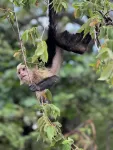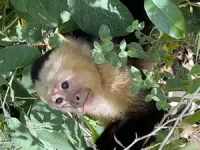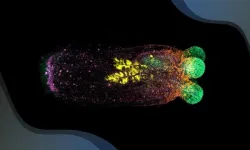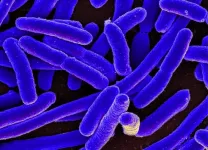(Press-News.org) Images/videos of capuchin monkeys
ANN ARBOR—The immune performance of wild capuchin monkeys declines when the animals experience higher temperatures, and younger monkeys seem to be particularly vulnerable to heat, according to a University of Michigan study.
U-M anthropology doctoral student Jordan Lucore examined how the immune systems of wild monkeys in Costa Rica were impacted by temperature. Lucore and a team of researchers found that when monkeys experienced about two weeks of warmer temperatures—86 degrees Fahrenheit—their generalized immune system performance declined. This is the part of the immune system that is activated as soon as the body senses a threat.
Their findings, published in Science Advances, were a surprise, Lucore said. Scientists expect endotherm animals—animals that can regulate their own body temperature, like mammals—to be able to protect themselves against fluctuating temperatures because they can maintain a constant body temperature.
"We think this has implications for understanding the effects of climate change because we're seeing this unlikely relationship between the immune system and temperature in this particular study species, and we're seeing it at much lower temperatures than expected," Lucore said. "Eighty six degrees Fahrenheit is not that hot."
For the study, Lucore examined a population of wild white-faced capuchins in the Taboga forest reserve of Costa Rica. Launched in 2017, the Capuchinos de Taboga Research Project focuses on the cognition, endocrinology and behavior of these primates. The project is co-directed by Jacinta Beehner, U-M professor of anthropology and psychology; Thore Bergman, U-M professor of psychology; and Marcela Benítez, professor of anthropology at Emory University, all of whom are co-authors of the study.
"Capuchins are thought of as generalist species because they live in a lot of different places with different climates and diverse ecologies. They're successful generalists," Lucore said. "That was another concerning thing about the results: I can't believe we're seeing this in capuchins. They are quite resilient."
Studying the immune system can be invasive: Biomarkers are typically found in blood serum, which can only be extracted in invasive ways. But Lucore examined a biomarker called neopterin, which can be measured in urine.
The researchers used a "clean catch" method to collect the urine. Urine that falls on the ground or other leaves often can't be used because it may be contaminated, Lucore said. Taking care to not stress the animals or get too close, the researchers followed the monkeys, which are habituated to human presence, until they urinated. The researchers then caught the urine using a basket wrapped in plastic attached to a stick. Field researchers at the site can individually identify each monkey to keep track of which urine samples belong to particular individuals.
Lucore measured the amount of neopterin in the urine and modeled the temperature in the days and weeks leading up to the urine collection. The researchers found that immune performance declined when the monkeys experienced two weeks of high temperatures. They also saw that younger monkeys experienced the strongest impact on immune performance.
"We discovered that young individuals' immune systems may be particularly affected by temperature compared to the rest of the age groups," Lucore said. "This is especially important for potential health and fitness outcomes, because when you're young, you rely on your generalized immune system. Your adaptive immune system has not yet developed."
The adaptive immune system is the component of the immune system that recognizes specific pathogens—something that takes time, up to several years, for young animals to develop.
Lucore said the researchers don't know yet whether this has long-term impacts for health in wild animals. Longer-term studies will need to look at multiple generations to conclude whether the monkeys' decreased immune performance results in poorer health or reproductive outcomes. Lucore also said the results may be difficult to apply to humans, but they can tell us something about how climate change is impacting wild animal populations.
"Climate change is happening. It's going to have effects on anyone living on Earth in ways that you may not expect, and especially on these fundamental systems that we need to survive," Lucore said. "The fact that a graduate student like me can go out there and collect rather short-term data and find strong evidence that temperatures are affecting the physiology of wild animals—I think that's a pretty important thing to keep in mind."
The Capuchinos de Taboga field team, specifically co-authors Amy White, Lorena Sinclair, Vasco Alexandre Martins, Sarah Kovalaskas and Juan Carlos Ordoñez, were instrumental in the study. Co-author Andrew Marshall, U-M professor of anthropology and of ecology and evolutionary biology, provided critical analysis and interpretation of the study.
END
Warming temperatures impact immune performance of wild monkeys, U-M study shows
2024-11-29
ELSE PRESS RELEASES FROM THIS DATE:
Fine particulate air pollution may play a role in adverse birth outcomes
2024-11-29
Embargoed for release: Friday, November 29, 2:00 PM ET
Key points:
Exposure to PM2.5 was associated with higher levels of inflammation among pregnant women, potentially leading to adverse birth outcomes.
Study examined PM2.5 and maternal and fetal health on a single-cell level, using an innovative technology to detect how pollution modified the DNA within individual cells.
Findings provide new understanding of the biological pathways through which air pollution affects pregnancy and birth outcomes, ...
Sea anemone study shows how animals stay ‘in shape’
2024-11-29
Our bodies are remarkably skilled at adapting to changing environments. For example, whether amid summer heat or a winter freeze, our internal temperature remains steady at 37°C, thanks to a process called homeostasis. This hidden balancing act is vital for survival, enabling animals to maintain stable internal conditions even as the external world shifts. But recent research from the Ikmi Group at EMBL Heidelberg shows that homeostasis can extend beyond internal regulation and actively redefine an organism’s shape.
The starlet sea anemone (Nematostella vectensis) possesses remarkable regenerative abilities. Cut off its head ...
KIER unveils catalyst innovations for sustainable turquoise hydrogen solutions
2024-11-29
Dr. Woohyun Kim's research team from the Hydrogen Research Department at the Korea Institute of Energy Research (KIER) has successfully developed an innovative nickel-cobalt composite catalyst that can accelerate the production and commercialization of turquoise hydrogen.*
*Turquoise Hydrogen: A technology that produces hydrogen and carbon by decomposing hydrocarbons such as methane (CH₄) (CH₄ → C + 2H₂). Unlike gray hydrogen, the most widely used hydrogen production technology, ...
Bacteria ditch tags to dodge antibiotics
2024-11-29
Bacteria modify their ribosomes when exposed to widely used antibiotics, according to research published today in Nature Communications. The subtle changes might be enough to alter the binding site of drug targets and constitute a possible new mechanism of antibiotic resistance.
Escherichia coli is a common bacterium which is often harmless but can cause serious infections. The researchers exposed E. coli to streptomycin and kasugamycin, two drugs which treat bacterial infections. Streptomycin has been a staple in treating tuberculosis and other infections since the 1940s, while kasugamycin is less known but crucial in agricultural settings ...
New insights in plant response to high temperatures and drought
2024-11-29
Ghent, 29 November 2024 – We are increasingly confronted with the impacts of climate change, with failed harvests being only one example. Addressing these challenges requires multifaceted approaches, including making plants more resilient. An international research team led by researchers at VIB-UGent has unraveled how the opening and closing of stomata - tiny pores on leaves – is regulated in response to high temperatures and drought. These new insights, published in Nature Plants, pave the way for developing climate change-ready crops.
Global climate change affects more and more people, with extreme weather conditions ...
Strategies for safe and equitable access to water: a catalyst for global peace and security
2024-11-29
Water can be a catalyst for peace and security with a critical role in preventing conflicts and promoting cooperation among communities and nations - but only if managed equitably and sustainably, a new study reveals.
Experts have devised a blueprint to ensure safe, equitable and sustainable global access to clean water. The seven-point strategy will allow water challenges to be governed effectively so they do not create conflict when access is restricted or usage unfairly shared.
Publishing ...
CNIO opens up new research pathways against paediatric cancer Ewing sarcoma by discovering mechanisms that make it more aggressive
2024-11-29
Ewing sarcoma is a tumour of the bones and soft tissues that occurs in children and young people. A quarter of patients do not respond well to therapy.
The group led by Ana Losada, at Spain’s National Cancer Research Centre (CNIO), has discovered an alteration in the most aggressive cases that affects genes never previously related to this disease.
This finding expands the list of potential prognostic markers and therapeutic targets in the most aggressive cases of Ewing sarcoma.
The new research is published in EMBO Reports.
Ewing sarcoma is a tumour of the bones and soft tissues that occurs in children and young people. ...
Disease severity staging system for NOTCH3-associated small vessel disease, including CADASIL
2024-11-29
About The Study: The findings of this study suggest the NOTCH3-associated small vessel disease (NOTCH3-SVD) staging system will help to better harmonize NOTCH3-SVD and cerebral autosomal dominant arteriopathy with subcortical infarcts and leukoencephalopathy (CADASIL) cohort studies and registries; may improve individualized disease counseling, monitoring, and clinical management; and may facilitate patient stratification in clinical trials.
Corresponding Authors: To contact the corresponding ...
Satellite evidence bolsters case that climate change caused mass elephant die-off
2024-11-29
A new study led by King’s College London has provided further evidence that the deaths of 350 African elephants in Botswana during 2020 were the result of drinking from water holes where toxic algae populations had exploded due to climate change.
The lead author of the report says their analysis shows animals were very likely poisoned by watering holes where toxic blooms of blue-green algae, or cyanobacteria, had developed after a very wet year followed a very dry one.
Davide Lomeo, a PhD student in the Department of Geography at King’s College London and co-supervised by Plymouth Marine Laboratory (PML) and ...
Unique killer whale pod may have acquired special skills to hunt the world’s largest fish
2024-11-29
Killer whales can feed on marine mammals, turtles, and fish. In the Gulf of California, a pod might have picked up new skills that help them hunt whale sharks – the world’s largest fish, growing up to 18 meters long.
Whale sharks feed at aggregation sites in the Gulf of California, sometimes while they are still young and smaller. During this life-stage, they are more vulnerable to predation, and anecdotal evidence suggests orcas could be hunting them. Now, researchers in Mexico have reported four separate hunting events.
“We show how orcas displayed a collaboratively hunting technique on whale sharks, characterized by ...







